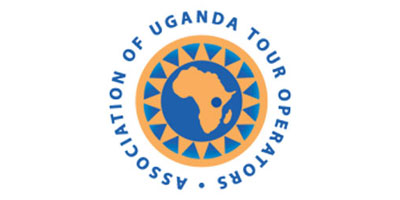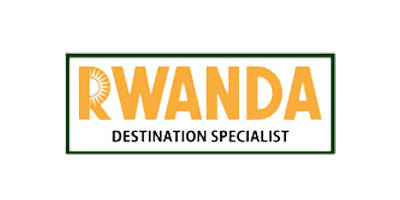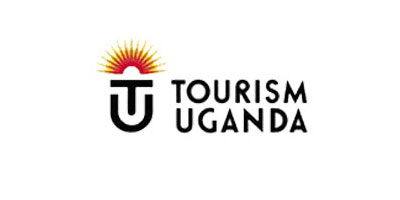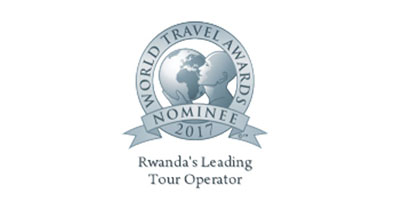Rwanda parks & attractions
Mount Bisoke Volcano

Mount Bisoke (also called Visoke), standing at 3711 meters/12175ft above sea level, is a dormant volcano in Rwanda with part of it in the Democratic Republic of Congo where it is called Mt. Visoke. The peak of Mount Bisoke lies in Rwanda. It is one of the 8 volcanoes that make up the beautiful Virunga Mountains that are spread along the borders of Rwanda, Uganda and the Democratic Republic of Congo. And Mt. Bisoke is one of the 5 Virunga volcanoes that straddle into Rwanda and make up the Volcanoes National Park – Rwanda’s most popular national park.
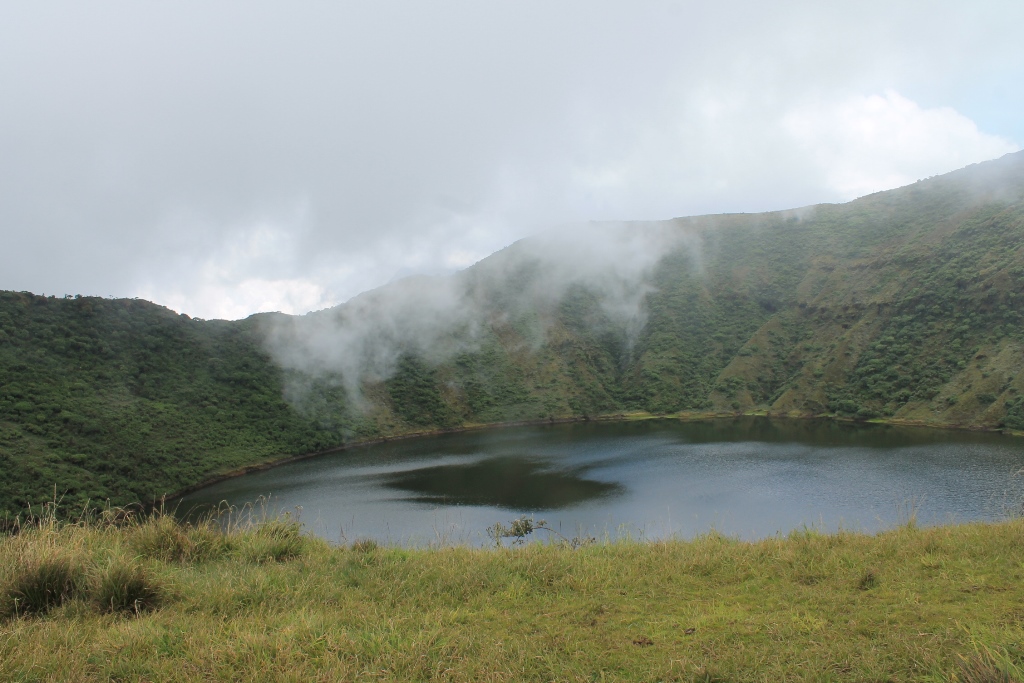
Mount Bisoke is the most popular volcano for hiking and trekking tours in Rwanda mostly because of its large crater lake at the summit which is also the largest Crater Lake in the Virungas measuring 400m in diameter and about 100 meters in depth. Mt Bisoke volcano has another crater lake named Ngezi on the side about 11km from the peak. It is little wonder the volcano was named “Bisoke” by the locals, which is a term meaning “soaked with water” because of the lakes.
Mount Bisoke has a perfect conic shape, covered in green from the base to the peak with varying vegetation zones that range from a little bamboo at the bottom that ends at 2800m, through Hagenia Hypericum (2800m – 3200m), to a Sub-alpine zone at the top.
The slopes of Mount Bisoke which are largely covered by forest harbor a variety of wildlife. The most popular are the endangered mountain gorillas, with several groups occupying territories on the mountain. There are several habituated groups on the volcano which are used for the famous gorilla trekking tours. The other primate on Mt. Bisoke is the golden monkeys which live in the forests at the base of the volcano. Both the mountain gorillas and golden monkeys are endemic to the Albertine rift valley in which the Virungas are located. Other animals include the forest elephants, buffaloes and duikers.
adventure and sightseeing
Mount Bisoke hiking trails
Hiking and trekking trails - Awaits you!
There are two mountain hiking and trekking trails on Mount Bisoke as follows:
Bisoke Crater Lake hike

The Mount Bisoke Crater Lake hike involves trekking to the peak of the Bisoke volcano where you are rewarded with the breathtaking scenery and views of the largest crater lake of the Virunga mountains. This is the most popular hiking trail in Volcanoes National Park and arguably in Rwanda.
How long is Crater Lake hike and what do you expect to see on the trail?
The hike takes about 6 hours in total, with 4 hours of climbing to the top and 2 hours climbing back down. It can be more or less depending on hiking experience, fitness, pace and weather of the day. Experienced fit mountain climbers and hikers can get to the summit in 2 hours or less, while the non experienced and less fit can take up to 6 hours to the get to the peak. Fitness is therefore paramount for the Bisoke hike. The hike is in fact intended to be quicker so that you get to the peak earlier to enjoy the lake for a short time and begin the descend as the weather can change any time. Read this article on how to prepare for the Bisoke trek
The beautiful Crater Lake is the ultimate prize of the hike. However, the hike also offers sightings of the beautiful mountain wildlife along the way such as the various species of the trees, plants and shrubs many of which are unique to the Virungas or Albertine rift valley. The hike also gives hikers amazing views of the Virunga mountain range and will see other volcanic cones of Karisimbi, Nyiragongo & Mikeno (in Congo), Gahinga, Sabyinyo, and Muhavura. The biggest opportunity however is the chance of sighting the gorillas along the trails. If gorillas are found along the trail hikers are allowed only a glance of a couple of minutes and no taking pictures which is exclusive for the travelers doing the gorilla trek.
Lake Ngezi trek
The Lake Ngezi hike is a shorter adventure than the crater lake hike, taking about 4 hours in total depending ones pace. Lake Ngezi lies about 11km from the summit and was formed after an eruption in 1957. The lake overlooks Mount Gahinga. The Lake Ngezi trail can also be used for a nature walk or a birding trail where one can spend a full day recording many species of birds and other wildlife. And unlike the crater lake hike, on this trail you can go on a slow pace hence allowing you enough time to observe wildlife. However the gorillas cannot be viewed for long neither can you photograph them.
What is the Cost of hiking Mount Bisoke
Bisoke hiking permit or ticket
To hike Mount Bisoke (whichever trail) you need a permit or call it a ticket that you have to buy in advance. Below is the pricing of the Mount Bisoke hiking permit| FNR | FR | RC | EA | Students | |||
| N | FR | R | EAC | FR | |||
| $75 | $60 | RwF4000 | $55 | $65 | RwF2000 | $45 | $45 |
Other Mt. Bisoke hiking costs
After purchasing the permit, other costs of the tour include:Transportation
Transportation includes a car, driver and fuel. Even if you decide to use public transport to get to Volcanoes National Park you will still need a private car to take you from the park office in Kinigi where you register from and meet the park guides for briefing, and transfer to the trailhead near the park. It is therefore better to have private transportation from Kigali. The cost of private transportation from Kigali can range between $150 – $200 per day depending on a number of people and therefore capacity of the car. The smallest car you can use for a maximum of 3 people is an SUV (Land Cruiser Prado or RAV4). For 4 or more people you can use the big safari jeep (takes up to 7 people).Accommodation (and meals)
You will need to spend at least a night in Ruhengeri near the park before your hike. There is a variety of accommodation options depending on the level of comfort you want and your budget of course. Price of decent accommodation with a degree of comfort starts from $70 per night including all meals. Note, it is possible in one day to travel from Kigali, hike Mount Bisoke and return. This is a option for those whose budget cannot allow them spend a night. It is however a hectic option. You will need to leave Kigali at 4.30am and be at the park office by 7am.What to carry for the Mount Bisoke hike
These are the essential items for the trek
- Good hiking shoes to keep you stable on the tough terrain that can get really muddy in case it rains. The shoes need to be light though to prevent the burden of extra weight on you.
- Rain jacket/poncho. The weather can any time so you should be prepared for rain.
- Warm sweater. If may need this to keep you warm especially if think temperatures can drop to below 5 degrees at the higher elevations.
- Proper outdoor clothes – long pants and long sleeved shirt. The long options are to protect your body from stinging nettles and prickly plants. Proper clothing also allows easy movement of your body as you hike through steep areas.
- Garden gloves to keep your hands warm and protect your hands in case you have to push plants or branches out of the way. There is a risky of touching a stinging nettle.
- Sunscreen, because when it shine it is really hot and can burn your skin
- Head gear to protect your hair from particles falling off trees and also keep your head warm in the chilly higher elevations.
- Drinking water. A must to rehydrate because you lose a lot through sweat.
- Snack to eat because you will be hungry by the time you get to the peak after the tough hike. You need your energy levels back before the descend.
- Copy of your passport. This is required for your registration at the park office in Kinigi. Without it you will not be registered for the activity and you will not be allowed to join the hike.
A wooden trekking stick will be provided free of charge
Porters are available for at $10 and you are encouraged to take one
Mount Bisoke hiking tours
Lets us take care of the arrangements necessary for your tour. Book one of these tours below and we shall organize everything.
